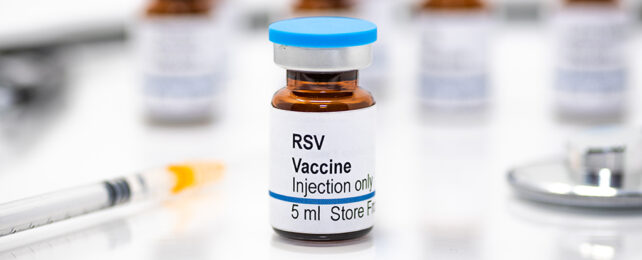For the first time, a vaccine to protect against respiratory syncytial virus (RSV) seems poised to help thousands. The vaccine received approval on May 3 by the US Food and Drug Administration (FDA) for people over 60, and it's a significant moment that's been decades in the making.
Should it receive approval from the US Centers for Disease Control and Prevention – which could be granted by June – the vaccine would be available at pharmacies and clinics in the US by autumn.
In most cases, RSV isn't much worse than a common cold, but for older people, especially those with underlining health conditions, it can be deadly. In the US alone, around 14,000 people over 65 die every year due to RSV, with many more tens of thousands admitted to hospital.
Very young children are also at risk if the virus takes hold. Severe infections account for an estimated 100 to 500 infant deaths in the US every year, with the number in developing countries much higher.
It's a serious health problem, which is why work on an RSV vaccine has been going on for decades – until now, without success. The vaccine drug, dubbed Arexvy, from the pharmaceutical firm GSK, protects against lower respiratory tract disease (LRTD) caused by RSV.
"Today marks a turning point in our effort to reduce the significant burden of RSV," says Tony Wood, the Chief Scientific Officer at GSK in the UK. "Our focus now is to ensure eligible older adults in the US can access the vaccine as quickly as possible and to progress regulatory review in other countries."
Development of the vaccine was spurred on by a closer analysis of the protein that RSV uses to fuse with and infect cells, and antibodies could be made from this. A similar technique was also used to develop COVID vaccines in recent years.
Approval for the vaccine was granted after a trial of almost 25,000 participants, with half receiving Arexvy and the other half receiving placebos.
In people aged 60 or over, Arexvy reduced the risk of getting lower respiratory tract disease through RSV by 82.6 percent and of developing severe disease by 94.1 percent.
The results of these trials were published in The New England Journal of Medicine earlier this year.
"Older adults, in particular those with underlying health conditions, such as heart or lung disease or weakened immune systems, are at high risk for severe disease caused by RSV," says Peter Marks, the director of the FDA's Center for Biologics Evaluation and Research.
"Today's approval of the first RSV vaccine is an important public health achievement to prevent a disease which can be life-threatening."
The estimate is that RSV costs the US around $1 billion in hospital costs every year, so this vaccine and any future ones should be able to make a significant dent in that. Other RSV vaccines, including one for pregnant women, are in the pipeline.
Work is already underway to get approval to administer the vaccine to people aged 50-59 as well, GSK reports. It is also expected to be given the all-clear in other countries in the near future, so we should soon see the benefit in terms of RSV cases.
"It's a very big deal to have options available to prevent RSV disease," Barney Graham, an immunologist at the Morehouse School of Medicine in Atlanta, told Nature.
